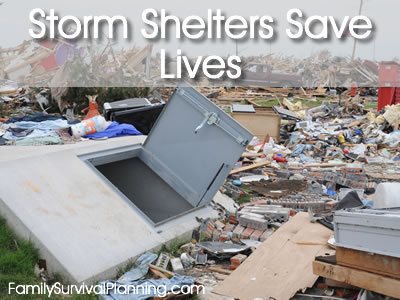- HOME
- Natural Disaster Survival
How to Survive
"Mother Nature's" Disasters

Why learn about natural disasters? Because we want to survive! I do — don't you? Let's get started...
Many weather-related disasters are somewhat predictable by our learned "weather" people — others happen without warning.
Preparing for all types of disasters in advance is important for your family's survival. "In advance" is the key phrase here — which means we all need to plan.
Invest in emergency food storage now and enjoy peace of mind for the next 25 years. Don't miss out on the savings!
Two things you can do to prepare for the unexpected — prepare 72 hour kits for each family member and develop a family emergency communications plan. These are needed whether the emergency is natural or man-made.
Disaster survival will depend on you learning about the area you live in and if it is vulnerable to certain types of natural disasters.
For instance, I live in earthquake country (not California!) - in Utah. Although there have been only a few small ones in my lifetime, we have been expecting the "big one" for longer than my days on this earth. They tell us we're overdue for it (supposed to happen every ~300 years).
So which natural disaster is your area likely to have?
Preparing For Mudslides
MUDSLIDES

Mudslides are devastating! If your home is at risk, what can you do to prepare?
Mudslides are a serious natural disaster. Southern California has been hit hard more than once.
In February 2018, what's known as an atmospheric river, brought more snow to northern California in a day than parts of New England have seen all winter. Redding, a city in California’s Central Valley, got more than 13 inches of snow.
After back-to-back years of expansive, record-breaking wildfires, [...]
Read the rest of this article...
Hurricanes Are Coming - Are You Really Prepared?
HURRICANE SEASON

Do you live in hurricane country? Begins every year around June 1st!
Learning how to prepare for a hurricane is mandatory if you live near a coast where tropical storms form, such as the Atlantic and Gulf of Mexico areas.
Not only are the winds terrific, there most likely will be flooding — sometimes far inland. It happened with Sandy on the New Jersey coast and recently in South Carolina.
Even though a hurricane can be fairly accurately predicted (at least that it IS coming), many people in South Carolina were not prepared — at all.
Others found they were not as prepared as they had assumed.
Read the rest of this article...
Know What To Do Before, During and After a Tornado
TORNADO SEASON

Do you live in "tornado alley"?
- Learn what to do before a tornado threatens;
- Learn what to do during a tornado watch or warning;
- Learn what to do after.
Tornado preparation is imperative if you live in an area where they are common or frequent.
Tornados may strike quickly, with little or no warning. They may appear nearly transparent until dust and debris are picked up or a cloud forms in a funnel. The average tornado moves southwest to northeast, but tornadoes have been known to move in any direction. The average forward speed is 30 miles per hour but may vary from stationary to 70 miles per hours, with rotating winds that can reach 300 miles per hour.
Read the rest of this article...
How to Prepare for Floods
FLOODS

Are you vulnerable to flooding? Learn what to do, and know, before, during, and after.
Historically, flooding is the single most common natural disaster in the U. S. However, not all floods are alike.
A river flooding can take days, whereas a flash flood can develop quickly, sometimes in just a few minutes, without any visible signs of rain.
Floods are a natural disaster that can happen no matter where you live, but especially if you live in a low-lying area, near water, at the bottom of a hill/mountain, or downstream from a dam.
Read the rest of this article...
How to Survive An Earthquake
EARTHQUAKES

Do you live in earthquake country?
Learn what to do before, during, and after an earthquake.
There is nothing more unexpected or less predictable than an earthquake.
It's not unusual for them to happen in the middle of the night. First you wake up to the feeling of your bed shaking. Then the books begin to fall from the shelves and pictures drop off the walls.
In the kitchen, cabinets fly open and dishes and pans crash to the floor.
If you're lucky, that will be the end of it. But most likely, the real shaking begins next. It can shake hard enough to toss you out of bed.
Read the rest of this article...
How to Protect Your Family From Wildfires and Forest Fires
WILDFIRES & FOREST FIRES

- Tips from the Red Cross Disaster Survival
- Tips for making your property fire resistant
- Tips to protect your home
- What to do if a wild fire threatens your home.
Wildfires and forest fires can be devastating. Whether you live in a rural setting, in the forest, or just near a green space area, you are vulnerable.
This fact became a reality for us in 2011 and again in 2012. (That's two too many times for me.)
We live in the foothills on the south end of the Salt Lake Valley. July/August are the months that are generally hot and dry.
As the hot south wind dried out the vegetation on the nearby hills, a spark [...]
Read the rest of this article...
Winter Survival Or 3 Ways To Die in Winter
WINTER STORMS/COLD

Living in a four-season area makes us vulnerable to winter storms.
- Learn what to do before and during a winter storm.
- Driving precautions in winter storms
I know that's a very negative and unpleasant statement, but we need to think about it and prepare — so NO ONE dies.
But let's face it, winter is a more dangerous time and we need to be prepared. We all know that winter comes somewhere on this planet all year around.
Most of us would prefer to just curl up in front of the fireplace with a good book, or stay in bed. We would feel safe if we could just do that.
But then life happens . . .
Read the rest of this article...
Self Reliance Will Save Us — Not FEMA
FEMA Won't Save Us

- - FEMA staffers are not first responders.
- FEMA provides technical and financial support only.
I don't think most people understand exactly what FEMA does and does not do, what their responsibilities are, and how they do help during a disaster.
I didn't know — so I did some research.
Here's what I learned:
FEMA staffers aren't and shouldn't be first responders.
Read the rest of this article...
Prepping Ideas For Cold Winter Days
WINTER PREPPING IDEAS

- Read a book
- Shop online for prepping supplies
- Organize supplies
My friend, Sharon, at SimplyCanning.com started my thinking about prepping in the winter when she posted on FaceBook about canning beans. So that's what started my thinking - besides, what else can you do on a cold snowy day? So here are a few ideas:
Read the rest of this article...
Heat Stroke and Heat Exhaustion from Extreme Heat
EXTREME HEAT

Do you live in a hot climate?
- Learn what to do before and during an extreme heat emergency.
- First aid for heat-induced illnesses.
Heat kills by pushing the human body beyond it limits. Under normal conditions, the body's internal thermostat produces perspiration that evaporates and cools the body. However, in extreme heat and high humidity, evaporation is slowed and the body must work extra hard to maintain a normal temperature.
Most heat disorders occur because the victim has been overexposed to [...]














